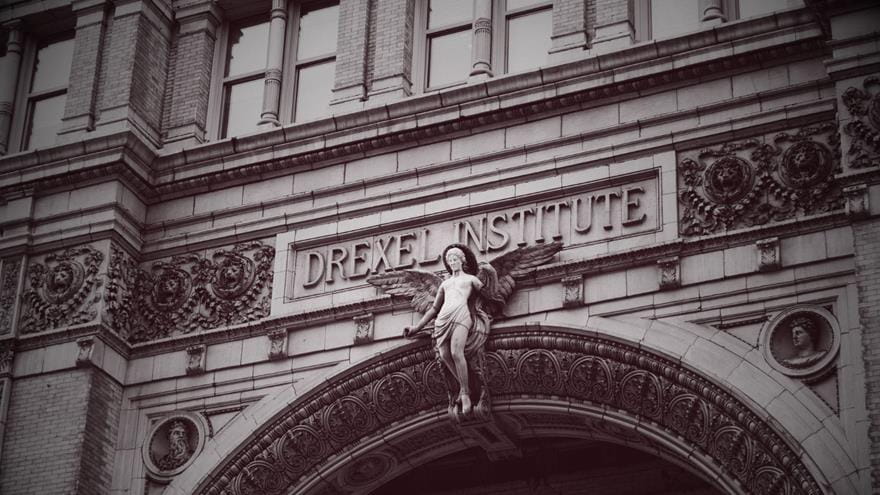A Drexel History of U.S. Presidents
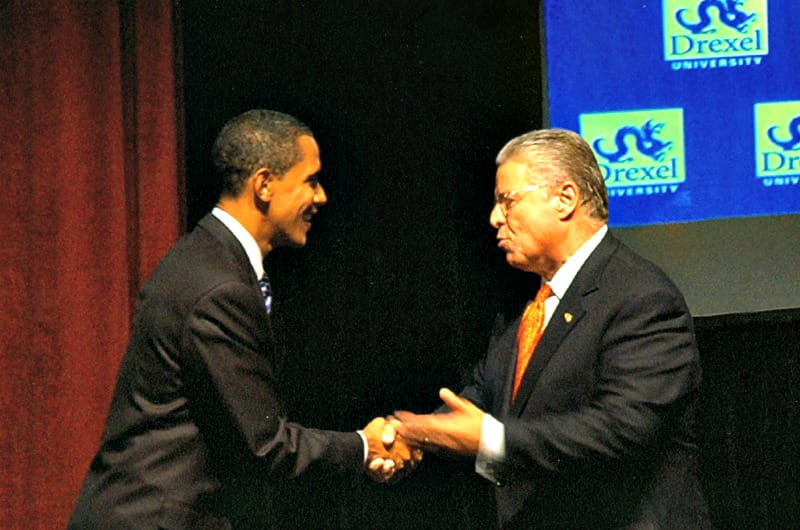
This article is part of the DrexelNow "Faces of Drexel" series honoring Drexel's history as part of the Universitywide celebration of the 125th anniversary of Drexel's founding in 1891.
As the 2016 presidential election comes to a close, DrexelNow looks back at some of the past presidents who have visited campus, befriended Drexel’s president or in some way been affiliated with Drexel throughout the University’s 125 years.
Barack Obama:
Current president Barack Obama visited Drexel when the University hosted a Democratic presidential debate in 2007. Obama, then a U.S. Senator from Illinois, took the auditorium stage with other presidential hopefuls in the Main Building and later addressed a crowd of Drexel students and met with Drexel’s then-President, Constantine Papadakis (1995–2009).
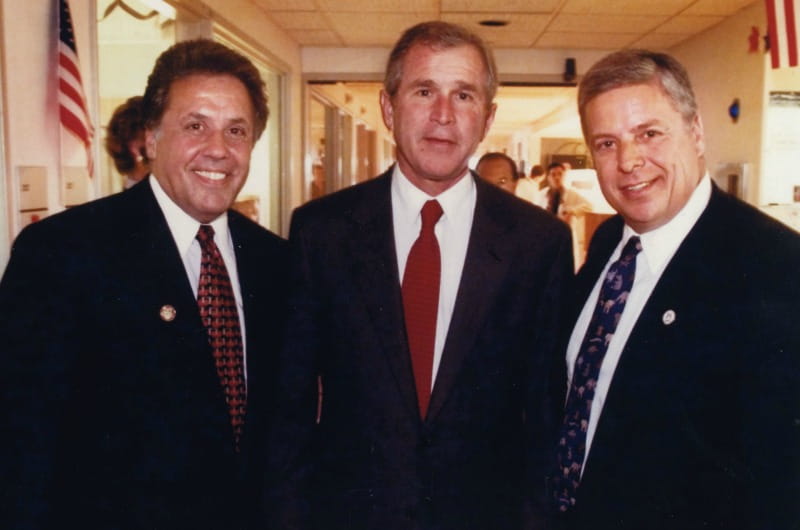
George W. Bush and Gerald Ford:
While current Drexel president John A. Fry was in his first year as the president of Franklin & Marshall College, President George W. Bush appointed him to the Benjamin Franklin Tercentenary Commission, a private and nonprofit alliance created to celebrate the 300-year anniversary of Benjamin Franklin’s 1706 birth in 2006.
Bush was also photographed with Papadakis in 2000 and 2004. In 2000, they met at Hahnemann University Hospital, the longtime teaching hospital of MCP Hahnemann University (MCPHU) that was in the middle of being acquired by Drexel, when former U.S. president Gerald Ford was taken there after suffering a stroke during the Republican National Convention. Ford was treated by Robert J. Schwartzman, MD, then-chief of neurology and current professor and emeritus chair of the Department of Neurology in the College of Medicine.
Bill Clinton:
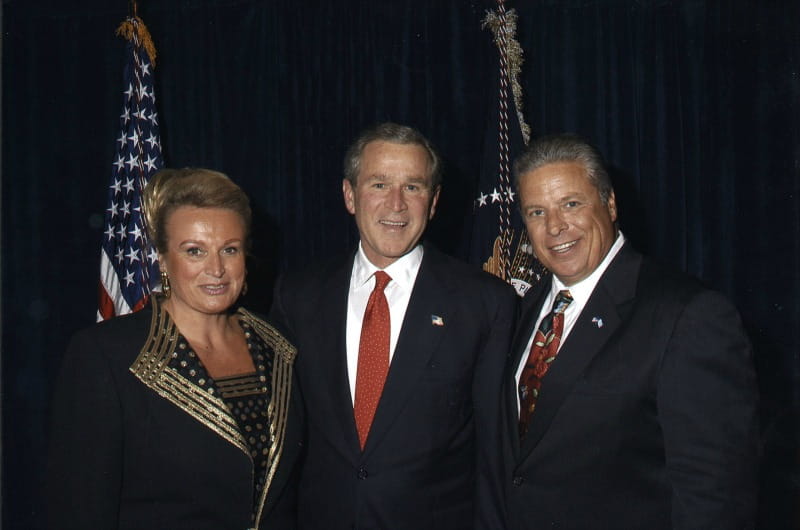
On April 22, 1992, Clinton visited Drexel when he was running for president to give an address on the environment, an event organized by James Spotlia, PhD, who is now the L. Drew Betz Chair Professor in the Department of Biodiversity, Earth & Environmental Science in the College of Arts and Sciences. An April 17 article in The Triangle announcing the event quoted Spotila as saying that “[Clinton] wanted his environmental address to be given at a major technological university.”
While on campus, Clinton attended a reception in the Anthony J. Drexel Picture Gallery and received a Presidential Medal by then-University President Richard Breslin (1988–1994) for his achievements as the governor of Arkansas.
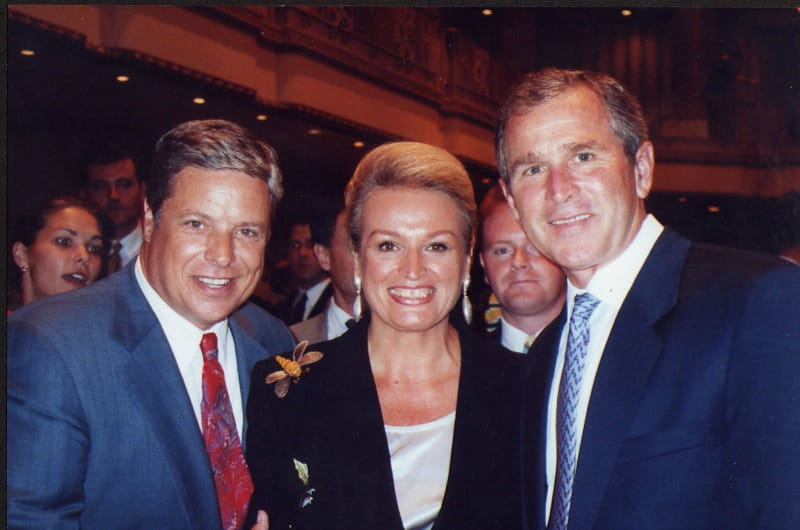
Clinton visited Drexel again during his 1996 re-election. On Oct. 29, 1996, he spoke to a crowd of over 10,000, including Drexel students and President Papadakis, at the University of Pennsylvania’s Hill Field, according to a Nov. 1 Triangle article.
In March 2006, Clinton returned to campus when Drexel’s Office of Government and Community Relations hosted CNN’s “Fit Nation” program with news anchor Sanjay Gupta. Drexel’s School of Public Health Dean Marla Gold, MD, who is now a professor and dean emerita in the school, and then-College of Medicine Dean Richard Homan, MD, were among the program’s guest panelists.
George H.W. Bush:
According to a Nov. 8, 1968, article in The Triangle, George H.W. Bush held a press conference on campus at the DAC when he was a congressman (R-Texas) and Republican spokesman for then-President-elect Richard M. Nixon.
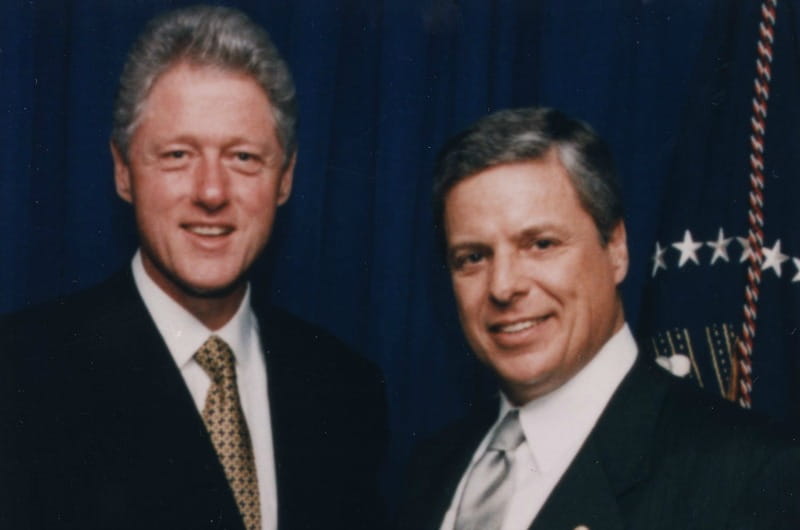
Papadakis and his wife were also photographed with Bush, though the photo is undated.
Richard Nixon:
Then-Vice President Richard Nixon visited the campuses of Drexel and the University of Pennsylvania, according to an Oct. 21, 1961, Triangle article.
Lyndon B. Johnson:
Lyndon B. Johnson befriended Drexel President William W. Hagerty (1963–1984), PhD, when Hagerty was the dean of the College of Engineering at the University of Texas and native Texan Johnson represented the state in the senate. When Hagerty died in 1986, The New York Times named him “a personal friend of Lyndon B. Johnson for many years.”
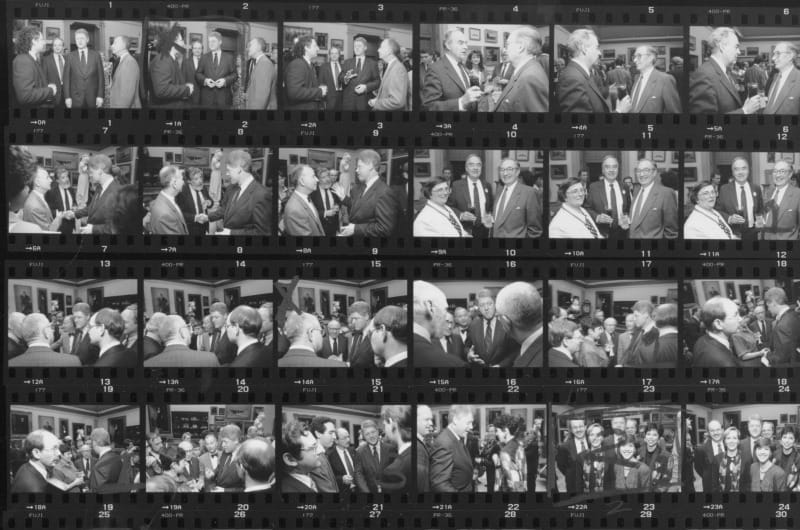
In April 1964, Johnson appointed Hagerty a member of the newly established commission for the selection of high school seniors, to be known as “Presidential scholars.” The commission was chaired by Milton Eisenhower, PhD, the brother of former U.S. President Dwight D. Eisenhower and then-President of Johns Hopkins University.
On Oct. 3, 1964, Drexel student Walter J. Stevens Jr. represented the then-Drexel Institute of Technology at a meeting of 230 student leaders at a reception hosted by Johnson and his wife. Stevens, who was the president of the Drexel Frosh Council, was recommended by Hagerty, according to an Oct. 9, 1964, Triangle article. Stevens later served as director of the Chemical Sciences, Geosciences and Biosciences Division of the U.S. Department of Energy and was honored as the biennial Chemistry Distinguished Alumnus for 2002–2003 by the College of Arts and Sciences.
In 1965, Johnson appointed Hagerty to the board of directors of the Communications Satellite Corporation (Comsat).
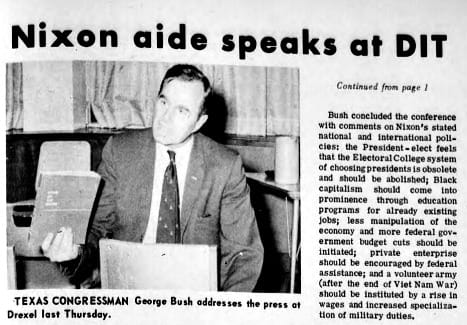
“I am glad to think that the President of the United States has this confidence in myself and Drexel. I am very honored by this appointment,” stated Hagerty, according to a July 16 Triangle article.
John F. Kennedy:
Tony's older brother Francis Anthony married Emma Bouvier, who is an ancestor of Jacqueline Kennedy, wife of President John F. Kennedy.
Dwight D. Eisenhower:
In May 1967, Drexel students Mike Markowicz, Stan Abrampon and Jeff Steinhorn presented Eisenhower with the first Tau Epsilon Phi Distinguished American Award, according to a June 2, 1967, Triangle article. The chapter brotherhood also voted to initiate Eisenhower as an honorary brother of Epsilon Eta Chapter of Tau Epsilon Phi Fraternity; the former president received his award and certificate of membership in a May 26 event.
“The general also discussed various topics with the TEP delegation, including the role of fraternities in college life and the Drexel cooperative plan of education,” reported The Triangle.
Harry S. Truman:
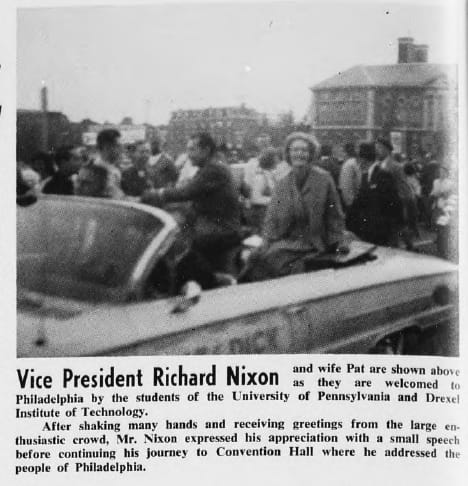
President Truman sent Drexel’s then-President James Creese (1945–1963) a congratulatory note to celebrate Drexel’s 60th anniversary. The letter, dated Oct. 16, 1951, was reprinted in an Oct. 26 Triangle article.
“The nation looks to institutions like Drexel and other educational training centers to train men in engineering, electronics and the other sciences vital to our rearmament program and our civilian economy,” he wrote.
Herbert Hoover:
In 1935, former U.S. President Herbert Hoover met Harriet E. Worrell, a Drexel alumnus, employee and volunteer, during a Penn-Yale football game on Oct. 10, 1935. Worrell earned two certificates from Drexel in 1909 (in commerce and finance) and 1915 (in domestic science) and worked as a secretary to Drexel’s President Kenneth G. Matheson starting in 1924 and a volunteer secretary for Drexel’s alumni association the year after.
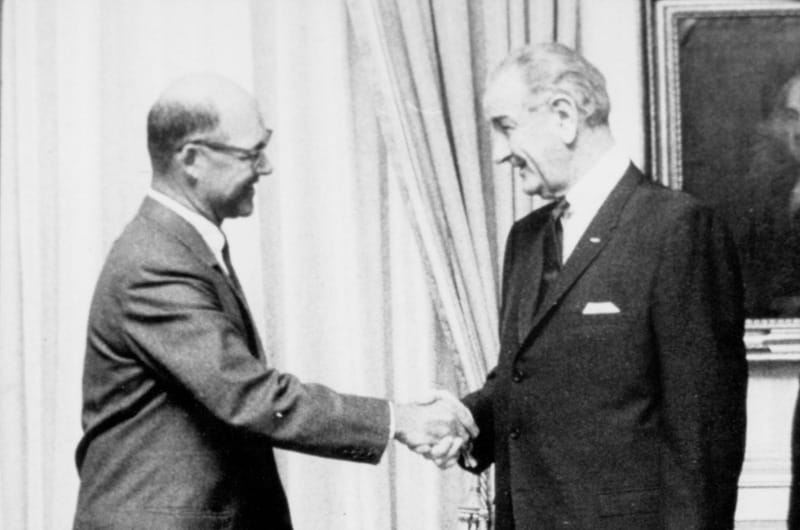
“Herbert Hoover is a fine man,” she said, according to an Oct. 18, 1935, Triangle article. “He is easy to talk to, informal, and was in high spirits as he arrived for his visit.”
Twenty-three years later, President Creese acted on behalf of 75 professional and scientific societies and gave Hoover a citation for being “the most illustrious member” of the engineering profession. Hoover wrote Creese a thank-you note, which was reprinted in a Jan. 18, 1952, Triangle article.
Franklin Delano Roosevelt
Future three-term president Roosevelt gave the commencement speech at the Drexel Institute on May 1, 1918 when he was the Assistant Secretary of the Navy. More than half a year before World War I would end, Roosevelt gave a speech about liberty, freedom, war and military service to the young Drexel graduates.
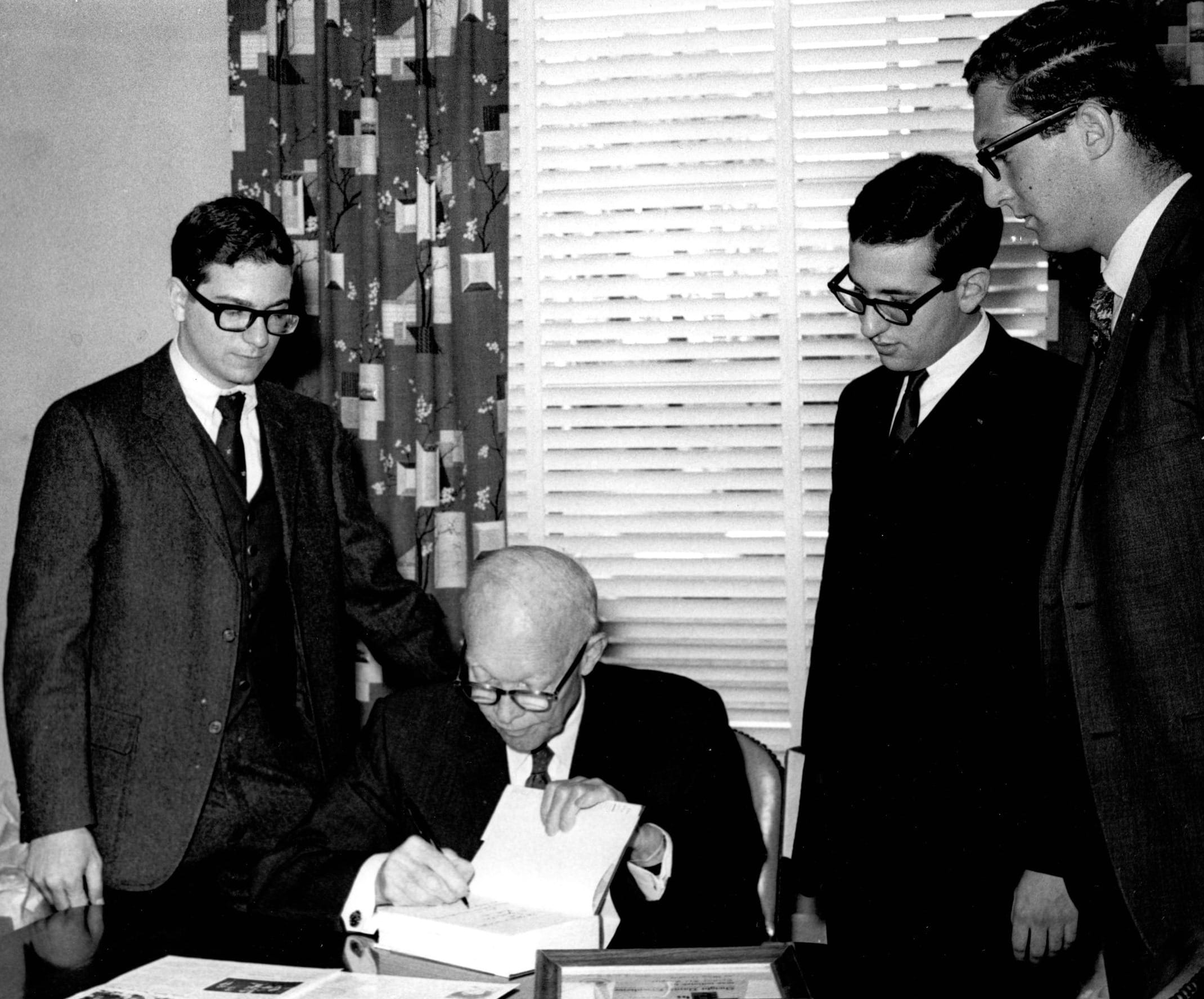
Ulysses S. Grant
No stranger to working with and advising U.S. Presidents through his banking company, University founder Anthony “Tony” J. Drexel and his lifelong friend and business partner, George W. Childs, befriended Grant in 1863 and remained friends for more than 20 years. Tony and Childs often hosted Grant either at their Philadelphia homes or at their adjoining summerhouses in New Jersey. In 1884, Grant died in a cottage in upstate New York owned by Tony’s younger brother Joseph and Tony served as a pallbearer at his funeral. University Archives has in its possession a letter Grant wrote to Tony in 1878 during his post-presidency trip around the world.
Tony turned down a position as secretary of treasury in President Ulysses S. Grant’s presidential cabinet, but he continued to advise Grant on financial affairs when he was president. Tony also personally managed Grants’ finances for years.
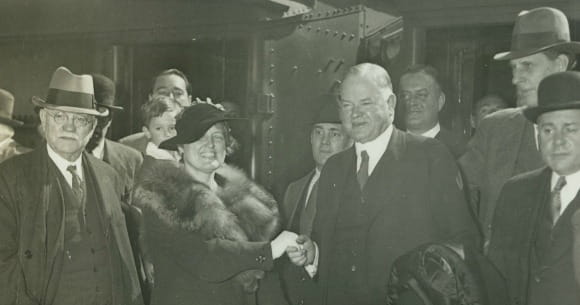
Miscellaneous Presidents
During its first 50 years, Drexel was in possession of Childs’ substantial collection of rare literary documents, manuscripts, letters and signatures donated to the University after he died. Part of the collection contained Childs’ personal correspondence with U.S. Presidents James Buchanan, Rutherford B. Hayes, Martin Van Buren and Grant. Childs’ collection also contained letters and autographs of the first 16 American presidents, some of whom also donated locks of hair now available in the Academy of Natural Sciences.
In This Article
Drexel News is produced by
University Marketing and Communications.

